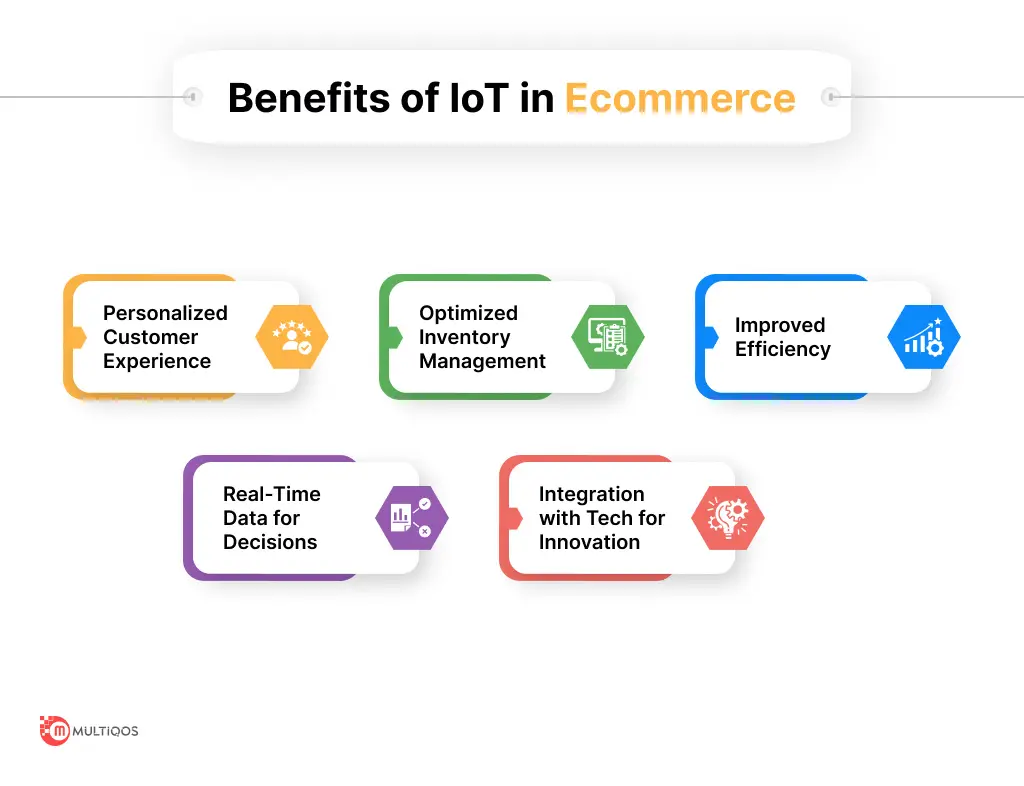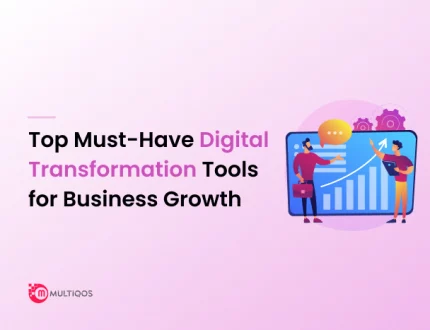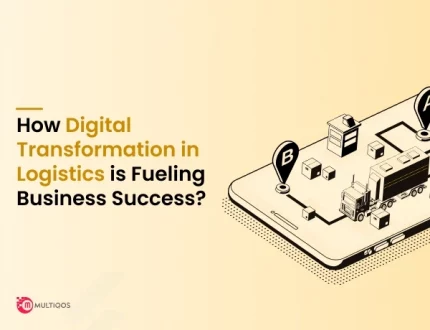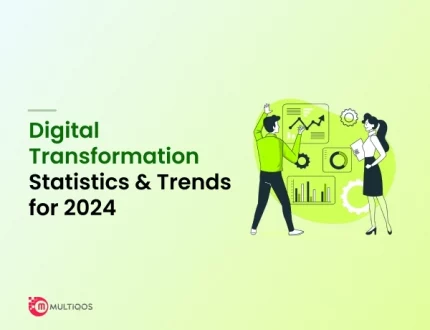IoT in eCommerce – How IoT is Revolutionizing the Future of E-commerce
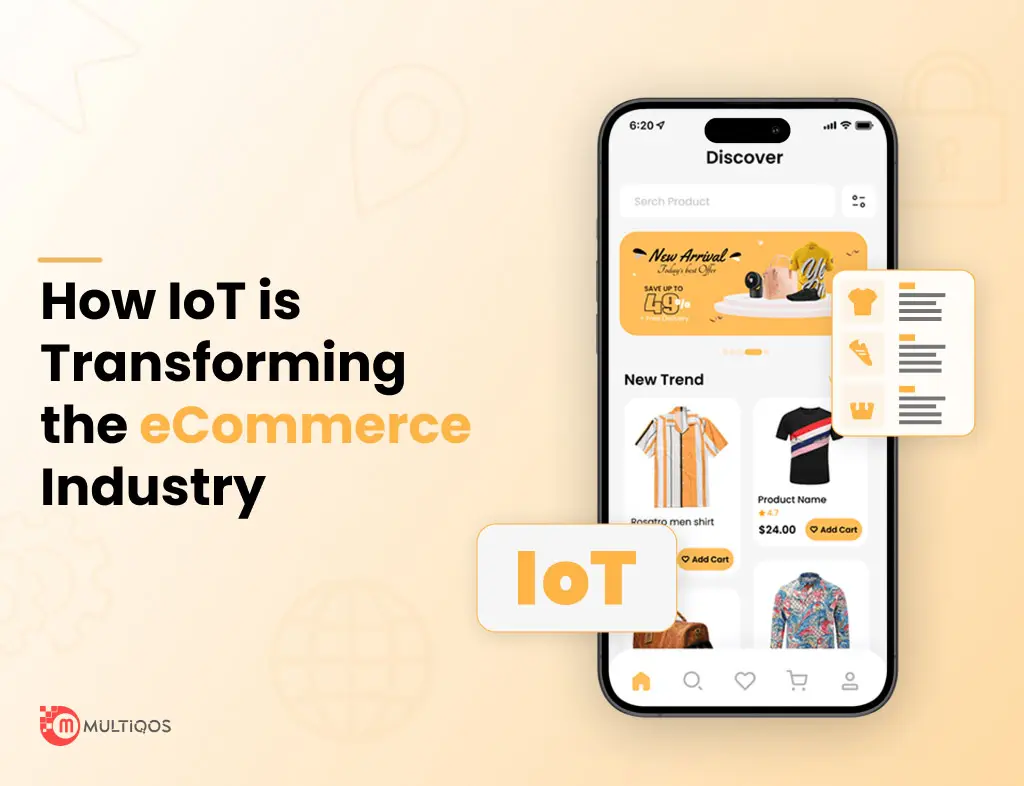
In this age of the Internet, technology is constantly improving. Since the dawn of time, living creatures have interacted with one another, and now the internet has made it possible for non-living objects to do the same. The “Internet of Things” is our term for this marvel. Thanks to the internet era, gadgets are increasingly linked, sharing information instantly and developing their own ecosystems. The Internet of Things allows you to lock the door with your smartphone, play music by just speaking to a gadget, and turn off the lights in your room with a single command.
However, did you ever consider building an eCommerce app to provide customers with a more cutting-edge and frictionless experience?
This article will cover how the Internet of Things is used in eCommerce and how it might improve the company’s operation. But before that, let us look at the current market scenario…
An Overview of IoT Technology’s Presence in the Market
A new study estimates the IoT industry will be worth 483.28 billion USD in 2022. By the end of 2028, it is anticipated to have grown at a CAGR of 29.4%, or 2,270.42 billion USD.
Now, you might wonder, “What is the cause of this enormous growth?”
Well, one of the causes is end-user industries. IoT is a driving force in various sectors, including manufacturing, healthcare, and the auto industry. The IoT enables smart connectivity for a smooth workflow while the industrial conventional sector experiences a major digital transition. In addition, the IoT industry has proliferated because of the easy accessibility of smartphones and the convenience of online buying. Additionally, incorporating the 5G network will make it possible for IoT devices worldwide to connect quickly and reliably.
But what is the Role of IoT in Enhancing eCommerce and Retail Industries?
With the help of some current data, let’s gain a better understanding of the function of IoT in the online eCommerce marketplace:
- Businesswire estimates that by 2028, the Internet of Things’ contribution to retail would be worth USD 182.04 billion.
- The same market predicted a 26% CAGR between 2021 and 2028.
- In terms of the size of the IoT market, it is projected to reach $300.3 billion in 2021 and reach 650.5 billion by 2026.
Use cases of IoT Integration in eCommerce Business
Users now feel more comfortable with the Internet of Things since various daily chores can now be accomplished with just a few easy instructions. IoT app development, however, goes beyond routine and simple chores. The high degree of gadget interconnection has been essential in elevating the eCommerce experience.
Let us discuss several application cases and how they improve the eCommerce scene.
-
Improved Inventory Control
The effectiveness of inventory management has risen due to specialized equipment such as Internet of Things (IoT) sensors and RFID tags. Without human assistance, these sensors and tags can read critical details about the goods, like their availability, expiration date, kind, and many other things. Similarly, the inventory owner can also make the appropriate decisions by being aware of the number and condition of the goods. As a result, with the help of the IoT, inventory management becomes substantially more accessible.
-
Supply Chain Administration
The supply chain’s goal is to deliver the merchandise at the proper location and time by tracking the whereabouts of the goods. One may access the product’s position in real-time and a sizable inventory using IoT-based gadgets. These sensors and RFID devices’ capabilities even transmit precise positions and delivery times. These IoT-based devices also ensure that the package is not delivered damaged, spoilt, or broken during delivery.
-
Customer-Specific Services
IoT gadgets and device connectivity have permeated millions of people’s daily lives, whether they know it or not. Each command you issue to an IoT device not only causes it to carry out a specific activity for you but also keeps some data. Firms and enterprises utilize this information to provide pertinent goods and services. To improve customer service and boost sales, businesses may use the data gathered by IoT devices.
-
Reduce Waste
Unsold inventory reduces a company’s profitability. Lack of understanding of market demand and inventory utilization is the leading cause of this waste. IoT here assists in analyzing customer behavior and doing the required calculations to determine the market demand for a specific product. Manufacturers may reduce waste by effectively using this information in manufacturing, ensuring the company’s operating strategy becomes even more profitable.
-
Smart Advertising And Marketing
IoT is fully aware of every search query a customer enters into any search engine or eCommerce site. Utilizing this knowledge, the product or service providers can easily promote pertinent goods or services. Advertising goods that customers often browse enhances the likelihood that they will make a purchase.
-
Troubleshooting
IoT assists not just in smart targeting and data use for a customized client experience but also in resolving several problems in AI development. Analyzing the data, enhancing the customer experience, and bolstering supply chain management, for instance, may be used to solve issues like missed shipments, return rates, cart abandonment rates, poor engagement, and many more.
What are the Advantages of Implementing IoT in the eCommerce Landscape?
IoT offers several benefits in the eCommerce marketplace platform. The IoT currently has the potential to secure competitive advantages for businesses operating in the online world since it has become a vital element for millions of customers. The following are a few of them:
- Forecasting market supply and demand for items help reduce waste and promote intelligent production.
- By signaling the need for replacement and repair, Internet of Things (IoT) devices linked to long-lasting machinery and gadgets can aid in improved maintenance.
- One may keep track of transactions, including where each order is going, how long it takes to deliver it, any problems or hiccups along the way, and other information.
- IoT automates the process by allowing for the management and execution of several tasks. Here, the tasks may include receiving, reordering, and shipping the items, making orders, and billing payments.
- IoT offers information and insight into client preferences, which substantially aids in making wise decisions. The valuable data is utilized to comprehend customer behavior, forecast trends in online buying, manage expenditures, and much more.
Challenges and Factors to Consider When Adopting IoT in eCommerce
When adopting the Internet of Things to develop a customized ecommerce marketplace, you must consider the following pitfalls:
- Data Security: It is crucial to ensure that the process is as open and equitable as possible while collecting individualized information. If not, you run the danger of offending consumers and exposing yourself to legal action and sanctions. It consists of two parts: user communication and regulatory compliance. Both must be at least acceptable.
- Device Security: Devices connected may be subject to assaults and exploitation. For instance, the owner’s email credentials might be shared via a Samsung smart refrigerator. And since the “zombie” devices were simple to infiltrate, IoT botnets like Mirai and Reaper have gained attention. Maintaining the IoT devices you use to stop hackers from taking over your system is crucial.
- Software Integration: Hardware in the Internet of Things is just one component of a much broader total. To operate the equipment and evaluate the data it produces, you also need specialist software, such as ERP systems, inventory management programs, predictive systems, etc. Since few businesses possess the necessary internal resources, there is a need for eCommerce web development services.
What is the cost of Developing an IoT Application?
The following factors affect how much IoT development services cost:
- Feature Scope
- Technology
- Cost Of Third-Party Services
- Hourly Rate of the Developer
- Developer’s Location
Hourly rates mainly influence the cost of developing IoT apps. For instance, if the creation of an app is outsourced to one of the best IoT app development firms in Eastern Europe, it may only cost $24,000 instead of the $100,000 it would cost in North America.
A conventional IoT system can cost up to $25,000, with prices starting at $15,000. Depending on the list of functionalities, a more complex solution might cost between $30,000 and $80,000.
How Can MultiQoS Simplify Your Business Operations with IoT Technology?
MultiQoS offers a specialized team of eCommerce app developers who can assist you in breaking into the international business community, whether you are looking forward to user engagement, brand value, or high ROI with efficient IoT apps.
Additionally, we have eCommerce specialists who assist companies in establishing their online presence using a variety of platforms. We focus on putting your company one step ahead of its rivals by combining the capabilities of both ideas with the cutting-edge app and website development services.
Concluding Thoughts on the Impact of IoT in eCommerce
The Internet of Things (IoT) is expanding quickly, and to stay competitive, you must perform better than your rivals by utilizing the most recent tools and technologies. You may increase client acquisition and retention, add value-added services to your business’s bottom line, and eventually, over time, significantly increase your company’s ROI by utilizing IoT-powered apps.
Ready to Level Up Your E-commerce Store?
Transform your eCommerce business with a custom IoT solution from MultiQoS.
FAQ about How IoT Transforming eCommerce Industry
By assisting businesses in reducing waste, streamlining company procedures, improving customer service, and more efficiently analyzing their operations, the Internet of Things is influencing the direction of eCommerce in the future.
An eCommerce app’s MVP may be completed in three to four months. However, it might get affected by customization to meet your unique business needs.
IoT technology provides shops with valuable data that can help them achieve high ROI. Building a solid relationship with consumers benefits a brand’s ability to increase brand value.
Get In Touch

